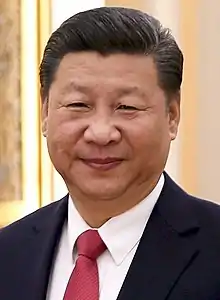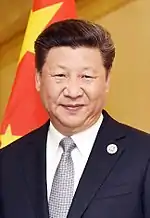Xi Jinping's cult of personality
A cult of personality has been developing around Xi Jinping since he became General Secretary and paramount leader of China in 2012.[1][2][3][4][5]

| ||
|---|---|---|
|
Policies and theories
Key events
Diplomatic activities
|
||
 | ||

Background
After Deng Xiaoping started the Chinese economic reforms and introduced the concept of collective leadership in the late 1970s, there was no longer a cult of personality around Chinese leaders.[6] When Xi came to power in 2012, he started centralizing power and paved the way for a cult of personality.[7]
The Chinese Communist Party has denied that there was any cult of personality. Xie Chuntao, director of the Central Party School's academic department, claimed the “respect and love” ordinary Chinese felt for Xi was “natural” and “heartfelt” and bore no similarities to a cult of personality.[6][8]
Characteristics
Since Xi assumed power in 2012, books, cartoons, pop songs and dance routines have honoured his rule.[9] In 2017, the local government of the Jiangxi province told Christians to replace their pictures of Jesus with Xi Jinping.[10][11][12]
Writing in the Sydney Morning Herald, Philip Wen notes that “perhaps the most stunning characteristic shared with Mao has been a growing personality cult around Xi fanned by the central propaganda department, which has produced some jarring results: newspaper front-pages dominated by Xi's every move, saccharine music videos professing love and loyalty to the leader.”[13] In May 2016, just prior to the 50th anniversary celebration of Mao's Great Proletarian Cultural Revolution, a “Mao-themed revival show” at the Great Hall of the People featuring revolutionary “red songs” was designed to generate nostalgia for the Mao era, with “giant images of Mao and Xi projected on stage.”[13]
When he was re-elected in 2017, Xi dominated the front page of the People's Daily[lower-alpha 1] compared to previous editions, which emphasized a “collective leadership” model.[14]
The political ideology bearing his name, Xi Jinping Thought, was enshrined into the Communist Party's constitution in the 19th National Congress in October 2017[15] and into the state constitution in 2018.[16] CCTV also showed members of the National People's Congress "crying in happiness" because of Xi Jinping's re-election as president in 2018.[17]
Since October 2017, many universities across China have placed “Xi Jinping Thought” at the core of their curricula, the first time since Mao Zedong that a Chinese leader has been accorded similar academic stature.[18] Fudan University revised their charter to remove "academic independence and freedom of thought" and include a "pledge to follow the Communist party's leadership", leading to protests among the students.[19][20] It also said that Fudan University had to “equip its teachers and employees” with “Xi Jinping Thought”, leading to concerns about the diminishing academic freedom of Fudan.[21][22]
Former inmates in the Xinjiang re-education camps claimed that they were forced to give thanks to the leader by chanting "Long live Xi Jinping."[23]
In October 2018, Hunan TV started airing a game show about Xi Jinping and his ideology.[24] In January 2019, Alibaba released a mobile app for studying Xi Jinping Thought named Xuexi Qiangguo. Within two months of its release, it was downloaded 73 million times.[25]
Apps such as Toutiao, Tencent, and Sina have been forced to use what has been described as "a super algorithm", where the story at the top "has to be about Xi".[26][27]

There are souvenirs containing Xi Jinping's images throughout shops in China.
On 15 June 2020, Xi's birthday, Study Times (学习时报), the media run by the Central Party School of the Chinese Communist Party, labelled Xi Jinping Thought as "21st Century Marxism".[28] It claimed that Xi Jinping Thought was the only scientific method to explain the Chinese Miracle in the 21st century. It also claimed to provide the "solution for the modern problems of humankind" and claimed that socialism was better than capitalism.
In October 2017 the party's Politburo named Xi Jinping lingxiu (领袖), a reverent term for "leader" and a title previously only given to Chiang Kai-shek, Mao Zedong and his immediate successor Hua Guofeng.[29][30][31] He is also sometimes called the "Great Helmsman" (大舵手),[17] and in July 2018 Li Zhanshu, the Chairman of the Standing Committee of the National People's Congress, referred to Xi as the "eternal core" of the party.[32] On 25 December 2019, the politburo officially named Xi as "People's Leader" (人民领袖; rénmín lǐngxiù), a title only Mao held previously.[33]
See also
Notes
- The paper is an official newspaper of the Central Committee of the Communist Party of China.
References
- "The rise of the personality cult of Xi Jinping- La Croix International". international.la-croix.com. Archived from the original on 2019-07-26. Retrieved 2019-07-26.
- Zhu, Jiayang Fan, Taisu Zhang, Ying. "Behind the Personality Cult of Xi Jinping". Foreign Policy. Archived from the original on 2019-07-26. Retrieved 2019-07-26.
- "Xi Jinping Personality Cult". www.globalsecurity.org. Archived from the original on 2019-07-26. Retrieved 2019-07-26.
- "The worrying buildup of a personality cult around Xi: The Yomiuri Shimbun". The Straits Times. 2018-01-30. Archived from the original on 2019-07-26. Retrieved 2019-07-26.
- "The power of Xi Jinping". The Economist. 2014-09-18. ISSN 0013-0613. Archived from the original on 2019-07-26. Retrieved 2019-07-26.
- "China 'won't allow' a Mao-style cult of personality around Xi". South China Morning Post. 2017-11-06. Archived from the original on 2019-08-18. Retrieved 2019-08-18.
- Zhu, Jiayang Fan, Taisu Zhang, Ying. "Behind the Personality Cult of Xi Jinping". Foreign Policy. Archived from the original on 2019-07-26. Retrieved 2019-08-18.
- "No cult of personality around Xi, says top China party academic". Reuters. 2017-11-06. Archived from the original on 2019-08-18. Retrieved 2019-08-18.
- Phillips, Tom (2015-09-19). "Xi Jinping: Does China truly love 'Big Daddy Xi' – or fear him?". The Guardian. ISSN 0261-3077. Archived from the original on 2019-04-27. Retrieved 2019-07-26.
- "Replace pictures of Jesus with Xi to escape poverty, Chinese villagers urged". South China Morning Post. 2017-11-14. Archived from the original on 2019-07-17. Retrieved 2019-07-26.
- Denyer, Simon (14 November 2017). "Jesus won't save you - President Xi Jinping will, Chinese Christians told". The Washington Post. Archived from the original on 31 May 2019. Retrieved 7 September 2019.
- Haas, Benjamin (2018-09-28). "'We are scared, but we have Jesus': China and its war on Christianity". The Guardian. ISSN 0261-3077. Archived from the original on 2019-08-23. Retrieved 2019-09-07.
- Wen, Philip. (May 13, 2016). China's Great Leap Backwards: Xi Jinping and the cult of Mao. Sydney Morning Herald.
- Hernández, Javier C.; Carlsen, Audrey (2017-11-09). "Why Xi Jinping's (Airbrushed) Face Is Plastered All Over China". The New York Times. ISSN 0362-4331. Retrieved 2020-06-03.
- "Xi Jinping's political thought to be added to party charter". South China Morning Post. 2017-09-18. Archived from the original on 2019-07-23. Retrieved 2019-07-26.
- "China to enshrine Xi's thought into state constitution amid..." Reuters. 2018-01-19. Archived from the original on 2019-07-26. Retrieved 2019-07-26.
- "An oath, and tears of joy in the Great Hall of the People | Top News". SupChina. 2018-03-19. Archived from the original on 2019-07-26. Retrieved 2019-07-26.
- "In China, universities seek to plant 'Xi Thought' in minds of students". Reuters. 2018-06-22. Archived from the original on 2019-08-01. Retrieved 2019-08-01.
- "Students protest at Shanghai's Fudan University". Asia Times. 19 December 2019. Retrieved 19 December 2019.
A video circulating this week showed students at Shanghai’s Fudan University singing the school song – which extols "academic independence and freedom of thought" – in an apparent protest.{...}Besides removing "freedom of thought", the ministry adds to the charter "arming the minds of teachers and students with Xi Jinping’s new era of socialist ideology with Chinese characteristics". It also obliges faculty and students to adhere to "core socialist values" and build a "harmonious" campus environment – a code phrase for the elimination of anti-government sentiment.
- 復旦大學章程刪除思想自由 學生唱校歌抗議要求學術獨立[影]. Central News Agency (in Chinese). 18 December 2019. Retrieved 19 December 2019.
- "Freedom curbs raise academic collaboration uncertainty". University World News. Retrieved 2020-06-30.
- "Chinese Universities Are Enshrining Communist Party Control In Their Charters". NPR.org. Retrieved 2020-06-30.
- Goldfarb, Kara (2018-05-18). "China Has Been Forcing Muslims To Drink Alcohol And Eat Pork In "Reeducation Camps"". All That's Interesting. Archived from the original on 2019-04-02. Retrieved 2019-08-01.
- bureau, Beijing (2018-10-04). "China has made a game show about its president". Archived from the original on 2019-07-26. Retrieved 2019-07-26.
- Li, Audrey Jiajia (2019-04-04). "Opinion | Uber but for Xi Jinping". The New York Times. ISSN 0362-4331. Archived from the original on 2019-06-16. Retrieved 2019-07-26.
- "Investigative Journalism in China Is Struggling to Survive". Freedom House. Archived from the original on 2020-05-06. Retrieved 2020-06-02.
- Kuo, Mercy A. (2017-12-07). "China's Media Market Competition". thediplomat.com. Archived from the original on 2017-12-04. Retrieved 2020-06-02.
The state also imposes what I call “a super algorithm” on these platforms – the story at the very top of every news website and news app has to be about Xi Jinping.
- "習近平新時代中國特色社會主義思想是21世紀馬克思主義--理論-人民網". theory.people.com.cn. Retrieved 2020-06-30.
- "Why China is reviving Mao's grandiose title for Xi Jinping". South China Morning Post. 2017-10-28. Archived from the original on 2019-07-24. Retrieved 2019-07-26.
- "Xi Jinping is no longer any old leader". The Economist. 2018-02-17. ISSN 0013-0613. Archived from the original on 2019-07-24. Retrieved 2019-07-26.
- "With tears and song, China welcomes Xi as great, wise leader". Reuters. 2017-10-20. Archived from the original on 2019-07-26. Retrieved 2019-07-26.
- Lam, Willy Wo-lap (1 August 2018). "Xi's Grip Loosens Amid Trade War Policy Paralysis". The Jamestown Foundation. Archived from the original on 29 July 2019. Retrieved 29 July 2019.
- Nakazawa, Katsuji (9 January 2020). "China crowns Xi with special title, citing rare crisis". Nikkei Asian Review. Archived from the original on 9 January 2020. Retrieved 10 January 2020.



.svg.png.webp)